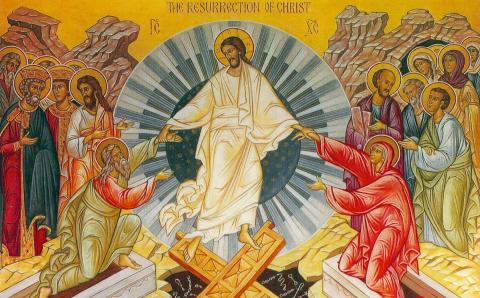Do not be afraid. I bring you good news that will cause great joy for all the people. Today in the town of David a Savior has been born to you; he is the Messiah, the Lord (Luke 2:10-11).
It’s Lent. Good Friday and Easter are drawing near, and we’re revisiting the angel’s Christmas announcement: “A Savior has been born to you.” Something feels out of place. Luke 2 is for December, not April. After all, how often do we sing Christmas songs in Lent? Yet recalling the story of Jesus’ birth in this season is fitting and good. Doing so reminds us that Jesus’ birth, death, and resurrection are intertwined actions that together reveal Jesus’ identity as our Savior. The cross was already in view at Jesus’ birth.
As we focus on Jesus’ sacrificial death for our sins, the announcement of Jesus’ birth provides a clarifying lens, helping us to see that Jesus is our Savior. In making himself nothing, “being made in human likeness,” Jesus continued to humble himself, “becoming obedient to death—even death on a cross” (Phil. 2:6-8). Jesus’ birth and death together serve as central acts in God’s revelation that Jesus is our one and only Savior.
With such a focus on who Jesus is, we are invited to acknowledge that we need saving, which leads us to ask, “What does Jesus save us from?”
The Heidelberg Catechism’s opening declaration teaches that Jesus “has set me free from the tyranny of the devil” (Q&A 1). Lord’s Day 11 emphasizes that Jesus “saves us from our sins.” Q&A 34 also emphasizes our salvation from both the devil’s tyranny and sin. In explaining Jesus’ suffering, Lord’s Day 15 points out that Jesus “deliver[ed] us, body and soul, from eternal condemnation” through his “atoning sacrifice.”
Later, the catechism explains that Jesus’ death on the cross saves us “so that the evil desires of the flesh may no longer rule us” (Q&A 43). Even when we experience trouble in this life, we receive assurance that Christ “has delivered [us] from hellish anguish and torment” (Q&A 44). Moreover, the Spirit “defends us and keeps us safe from all enemies” (Q&A 51). This salvation includes strengthening us to “firmly resist” our enemies: “the devil, the world, and our own flesh” (Q&A 127).
What we hear in the church’s teaching on salvation is that, in Jesus Christ, God has released us from the grip of each and all sin, has delivered us and protects us from every enemy—even ourselves—and assures us that the tyrannical devil has no authority over us. In other words, because Jesus “has removed the whole curse from [us]” (Q&A 52), we are assured in Christ, by his Holy Spirit, “of eternal life” and are made “wholeheartedly willing and ready from now on to live for him” (Q&A 1).
As such, the gift of salvation that we celebrate in Jesus’ birth and in remembering Jesus’ death and resurrection saves us from the twin death grip of our sin and the devil and ushers us into the inseparable certainty and freedom of new life in Jesus Christ.
About the Author
Chris Schoon serves as the Director of Faith Formation Ministries for the Christian Reformed Church and is the author of Cultivating an Evangelistic Character (Wipf & Stock, 2018).








